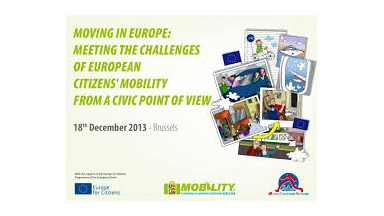The consultation process on the needs of European citizens' mobility and their point of view, carried out by Active Citizenship Network with the support of the EU Commission, clearly show what EU citizens demand from institutions and from the stakeholders.
- Firstly, to improve local public transport (regarding comfort and safety on board).
- In order to be able to use the bicycle in town we need to increase the infrastructures starting with bicycle lanes.
- On the positive side, a strong sense of solidarity stands out, since the EU citizens wish to further promote access to public transport for those citizens economically/socially most vulnerable or with reduced mobility - compared to what is already being done.
- Two Recommendations address the subject of rights & obligations: on the one hand, they calls for the real enjoyment of a right, the right to mobility for people with disabilities, specifically on the reduction of barriers; on the other, they urge people to acknowledge their obligations as citizens, giving high priority to the education for safe and environmentally friendly driving.
- The Civic Recommendation which focuses on Environmental Sustainability has a clear interpretation: it is no longer the time of employing remedies limiting the use of polluting means of transport (e.g. limit traffic according to even and odd numbers of license plates or Sundays on foot) we should instead invest on infrastructures for the use of less polluting cars.
Worth noting is the lack of indications on car sharing (clearly showing how this is still seen by the majority of citizens as not being a first choice option, and in some cases citizens do not even know this option exists) and on general interventions which may be capable of affecting the mobility system as a whole (e.g. increased competition among operators in the sector, plans to reduce traffic etc.. ). In this case, perhaps, it reflects a certain difficulty in framing the issue of mobility in the context of a broader planning centred on improving the quality of life in cities.
Anyway, what do these recommendations suggest?
Firstly, that European citizens are well aware:
- that in the world of transport there is no magic wand to help meet all our mobility needs and that the resources available are few. This is an important starting point because it allows us to address these issues with healthy realism, thus recognizing the responsibilities of and difficulties encountered by all the actors involved;
- that we are all - and not just the commuters - called upon to contribute to both individual and collective mobility needs, public and private;
- of the complexity of mobility since there is a link between:
- public services, to which certain rules and responsibilities apply, and the market, governed by other rules;
- collective and individual mobility;
- public and private actors;
- local/regional/national/supranational dimensions, as well as short-and long-term needs related to the present generations and to the future ones, with needs difficult to foresee at the moment;
- of mobility as a means to makes us feel European citizens.
And the secondly is that we need to act on what we already have:
- Most Civic Recommendations ask to systemise what is currently split and occasional. There are low-cost solutions which could meet the diverse mobility needs, and not seeing them implemented is annoying. More than revolutionising the system, the mobility of many Europeans would improve by implementing already tested solutions. Not surprisingly, the implementation of most Civic Recommendations requires the ability to enforce them more than investment in them;
- the awareness of the situation citizens experience every day does not correspond to the knowledge of what has been achieved or is being done through the work of the EU institutions;
- recent Directives have strengthened the legal conditions for a greater protection of passengers' rights, but they still need to strengthen the tools of protection and, in parallel, to support information to citizens by:
- supplying information at international airports, railway stations and main transport interchanges;
- promoting the APP that the European Commission has launched for air and rail transport, useful also for bus/coach transport and river and sea transport;
- involving civil society as a vehicle to reach a target of citizens otherwise not accessible since they do not know how to use new technologies or social media;
- regarding conciliation as a fast and economical way to resolve small disputes in transport;
- organising counselling and protection centres within the major interchange areas and where there is the most passenger flow.
On the eve of the European elections, we wish that this civic recommendation, emerged by the EU project “Mobility, a paradigm of European citizenship", be regarded as a constructive contribution to what associations and citizens have forwarded to the attention of institutional decision-makers at local, national and European level, as well as to the various stakeholders who are committed to working for a more sustainable mobility and in line with citizens’ expectations.
Mariano Votta
Director Active Citizenship Network




